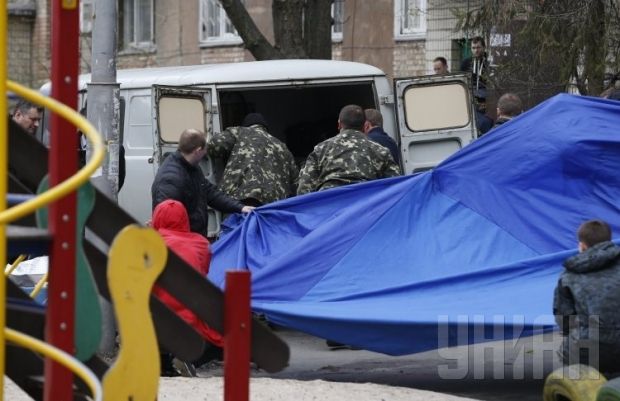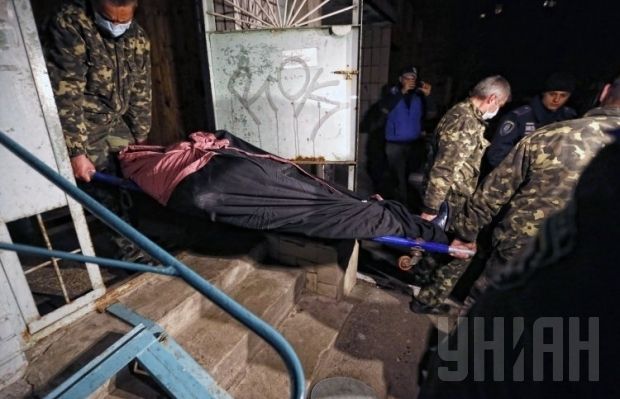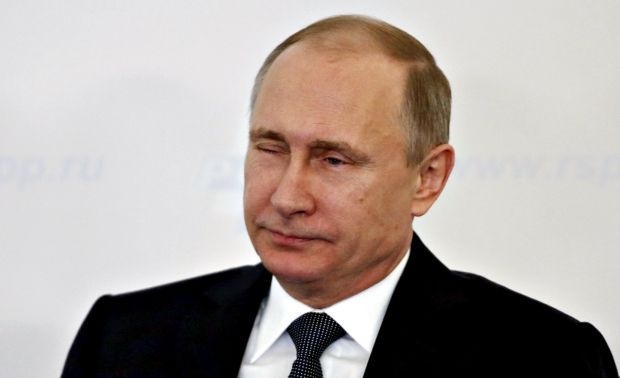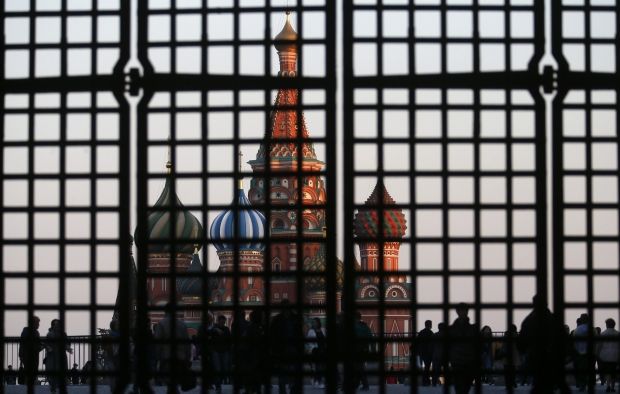
The Kremlin’s ritual sacrifice
The murders of Oleh Kalashnikov and Oles Buzyna could have been seen as someone eliminating witnesses, if it were not for the overly blatant PR from the Kremlin’s master on their deaths. UNIAN tried to see how clearly “Russian fingerprints” could be seen in these crimes.
After the recent wave of suicides of former allies and sympathizers of the fugitive Viktor Yanukovych’s regime, two controversial murders in a row – of ex-deputy of the Party of Regions Oleh Kalashnikov and journalist Oles Buzyna – could be seen either as reprisals against dissenters or against unwanted witnesses involved in the organization and financing of the “Antimaidan” [a movement which involved street thugs used by Yanukovich authorities to intimidate and threaten peaceful protesters in October 2013-February 2014]. But there is a catch to these versions, and not just one, which make such speculations invalid.
The leader of the “titushki”
The leader of the “titushki” [a colloquial term used to describe street thugs involved in the Antimaidan, derived from a last name of one of such delinquents who attacked journalists and got caught on camera], former deputy from the Party of Regions Oleh Kalashnikov was shot dead in Kyiv in the evening of April, 15 outside his apartment. According to the adviser of the Interior Minister, MP Anton Herashchenko, Kyiv police opened a criminal case under Art. 115 of the Criminal Code of Ukraine “Premeditated murder.” "The following main versions will be addressed: political activity, including the participation in the organization, financing and overseeing of the so-called “Antimaidan” which involved “titushki” at Mariinsky park; business interests, including issues of loans and debts; personal relationships; murder for robbery; and other versions,” said Herashchenko.
At the same time, in his opinion, “the deceased knew a great deal about sponsors and ways of sponsoring the Antimaidan that cost Yanukovych and his regime several million hryvnias a day, [and] he will take these secrets to the grave.”
In other words, the MP hinted that Kalashnikov had been murdered by former colleagues. Another deputy, Borislav Beryoza, also shared this opinion. According to him, Kalashnikov could blackmail his financial donors with the prospects of leaking information about the shady aspects of the Antimaidan. “Informed sources in Ukraine’s special services report that Kalashnikov, who was murdered today, was ready to begin cooperating with the competent authorities in terms of giving evidence. Why? Because, left without financial support, he began to blackmail his former employers to tell how he had organized the “titushki”, who had funded this and who organized all the processes,” said Beryoza, adding that this was the motive for the ex-Party of Regions member’s murder, which thus crippled the investigation.
It should be noted that the former colleagues from the Party of Regions, and now, the representatives of the Opposition Bloc in the new Parliament, refrained from commenting on the death of Kalashnikov (unlike in the case of Mikhail Chechetov’s suicide). There was not a single news piece in 24 hours on this issue on the Party’s Web site with condolences to Kalashnikov’s family and loved ones. Only personal profiles in social media of Nestor Shufrich (an opposition politician) and Mykola Azarov (a politician who fled the country along with Yanukovich) contained some comments.

Kalashnikov himself previously reported that he had been getting threatening mail since late February this year. He tied this with the fact that that he voiced pro-Russian rhetoric in his statements and never hesitated to voice his beliefs.
Being infamous is no reason for murder
Former colleagues, as ex-Prime Minister Mykola Azarov, hiding in Russia, tried hard to compare Kalashnikov to Russian opposition politician Boris Nemtsov, who was recently shot in the center of Moscow. Attempts to present the former MP from the Party of Regions as a martyr, claiming that the current Ukrainian government had allegedly unleashed “terror against political opponents” are more than questionable, as Kalashnikov has never been a significant political figure in Ukraine.
In 2006, he got into the news as he attacked the crew of Ukrainian TV channel STB outside the Verkhovna Rada. The journalists were beaten and their footage was taken away. The prosecutor's office opened a criminal case on the fact of impeding the legitimate professional activities of journalists, and nearly 650 representatives of different media signed an appeal to the Party of Regions demanding that they punish their party member. Then Kalashnikov simulated an apology to the press, and his party leadership could not figure out for a year how to deal with their errant deputy. In the end, he was not included in the electoral list for the parliamentary elections of 2007, but he was not excluded from the party. In 2012, Kalashnikov failed in another attempt to get to the Verkhovna Rada through a majority constituency in Kyiv.
Also he was considerably famed for his amazing ability to gather protesters on squares, for money. Real fame came in 2013, when Kalashnikov was named one of the organizers of the Antimaidan. However, nothing prevented Kalashnikov from organizing rallies with hired participants even after his former colleagues had fled the country. That is actually what he has been doing right in front of the “junta” authorities. Still, the version put forward by Mykola Azarov, of an assassination organized by the current government, seems untenable.
“If Kalashnikov really was a key witness in crimes against Euromaidan, involved in the organizing of “titushki” he would have been killed long ago,” says Volodymyr Fesenko, political scientist, head of the Penta Center for Applied Political Studies, “I frankly doubt this version. He is more a principal offender, as he was not a key figure in terms of organization of “titushki” across the country. He had some tasks in Kyiv, that’s all. I'm more inclined to believe that these killings are a large part of the PR project of Russian security services in order to demonstrate that there is supposedly political terror in Ukraine.”
Actually, the version voiced by Fesenko seems to also fit for the murder of journalist Oles Buzyna, which happened the day after the death of Oleh Kalashnikov. Buzyna was shot dead in broad daylight, just outside his apartment building in the center of Kyiv.
“It seems that the hunt for witnesses in the Antimaidan case continues. Everyone who was involved in the organization and financing of the Antimaidan or other unlawful acts against the Maidan and who feels a threat to his life, please contact the law enforcement agencies, so as not to follow in the path of Kalashnikov and Buzyna,” said Anton Herashchenko.
A little later he added that he does not rule out that both murders could have been “specifically planned and organized from Moscow, and they are one part of the plan for Ukraine’s internal destabilization... and further incitement of anti-Ukrainian public sentiment in Russia.”
It is noteworthy that the Opposition Bloc reacted swiftly to the murder of the journalist, unlike the case with the death of their colleague. A message by Vadym Rabinovich on this matter appeared later that day on the Web site of the political force. The deputy prime minister of the “shadow” Cabinet, appointed to oversee the law enforcement agencies demanded a report from Interior Minister Arsen Avakov to the Verkhovna Rada in the near future.
PR from someone else's death
However, and this statement seemed tardy, as the first one who claimed on live Russian TV that Ukraine is unable to cope with crime, and that dissident journalists are being assassinated was Russian President Vladimir Putin. And he did it within minutes of the murder, when the crime scene experts were still working. “This is not the first political assassination, there is a series of murders,” stated the master of the Kremlin. “In Ukraine, which seeks to become a democratic state and longs for a democratic Europe, nothing like this happens. Where are the killers of these people? There are none - neither the perpetrators, nor the organizers. Both Europe or North America prefer not to notice this.”

Theoretically, a haste of the Russian president’s statement can be attributed to a strong desire to use the death for his own purposes and interests, like shifting the focus of the public, already zombified by propaganda from the issue of Boris Nemtsov’s murder to “lawlessness” in the neighboring country, trying to portray it in an even worse way. This actually went in line with the overall strategy for the entire four-hour Putin Q&A. However, specifically in this case ignorance of Ukraine’s reality played a cruel trick on Vladimir Putin: the deaths of Kalashnikov and Buzyna are far from the scale of the murder of Nemtsov. That, however, does not diminish the need for Ukrainian law enforcement agencies to solve the cases of both crimes committed in Kyiv as soon as possible.
According to the political strategist Andriy Zolotaryov, conspiracy theories have emerged that “Buzyna was murdered specifically for Putin’s press conference.” But in his opinion, Buzyna and Kalashnikov “were killed by the atmosphere of hatred and rejection of a different point of view.” Zolotaryov admits that there may stand a third party behind these murders, “but hatred also kills, and it should be understood.” “We have passed too quickly a distance from sorting things out with fists to using weapons for this matter.” I think that these are not the last victims... If we take Sweden as an example, where the last political assassination happened back in 1986 when Prime Minister Olof Palme was killed, I cannot imagine anyone there sorting things out this way,” he explained.
In turn, Fesenko said that Vladimir Putin quite promptly used both murders “to confirm the thesis of alleged political terror” unfolding in Ukraine. “The fact that people were killed who really did not much weight in the current opposition and have not been involved to any protest movement, but were just notorious pro-Russian figures, suggests that Kalashnikov and Buzyna were made sacral victims and were a ritual sacrifice on the altar of Russian propaganda,” he said.
Ritual sacrifices for Russia and the EU
According to the analyst, Putin had to give Russians evidence of political terror in Ukraine. And this was done at the press conference. “Of course, these are just speculations, but the coincidence of these circumstances gives grounds for such conclusions,” he states. “It's all done for the Russian audience, and to frighten Europe.”
Fesenko said that in the coming weeks an EU-Ukraine summit is set to take place. The EU leaders plan to visit Kyiv. “So, such demonstrative murders are a way to discredit Ukraine. Very clearly they fall within a PR plan, some PR strategies that can be implemented by the Russian special services,” said the political strategist.
Taras Zahorodniy, political scientist, head of the National Crisis Group also shares this opinion, “We know that neither Kalashnikov nor Buzyna were persecuted in Ukraine, no one bothered them. We know that Kyiv is 70% Russian-speaking city, and that there are no “fascists” here. But Russian propaganda lives in its own world and [has] its own logic. They needed sacrifices, which are in their interests.”

According to him, it is clear that it’s not Ukraine that is the target of such statements by Russia’s president. “They are for the Russian consumer, forcing the Russians to fall in hysteria, as well as for western people, who understand that there must be no politically motivated persecution of opponents,” said the analyst.
Firstly, neither Kalashnikov, nor Buzyna were publicly significant figures in Ukraine. The Russians also know that Kalashnikov is the former representative of the Party of Regions, which was subject to certain “persecution”, as knowingly some of the ex-members of the Party are now hiding in Russia. Russians also know that Buzyna was a pro-Russian journalist who has repeatedly visited Moscow and spoke on Russian television.
Secondly, it allows the Kremlin to talk about political killings not only in Russia, but also in Ukraine, which is successfully superimposed on the statements by Russia’s representatives in Europe that the “fascists” came to power in Kyiv, killing people for their opposing beliefs.
And, it seems, in a sense, that Putin has achieved his goals. In particular, the OSCE Representative on Freedom of the Media Dunja Mijatović condemned the murder of journalist Buzyna and called for an immediate investigation of the crime by the competent authorities.
Now it is all up to Ukrainian law enforcement.
Konstantin Goncharov, Tatiana Urbanskaya

